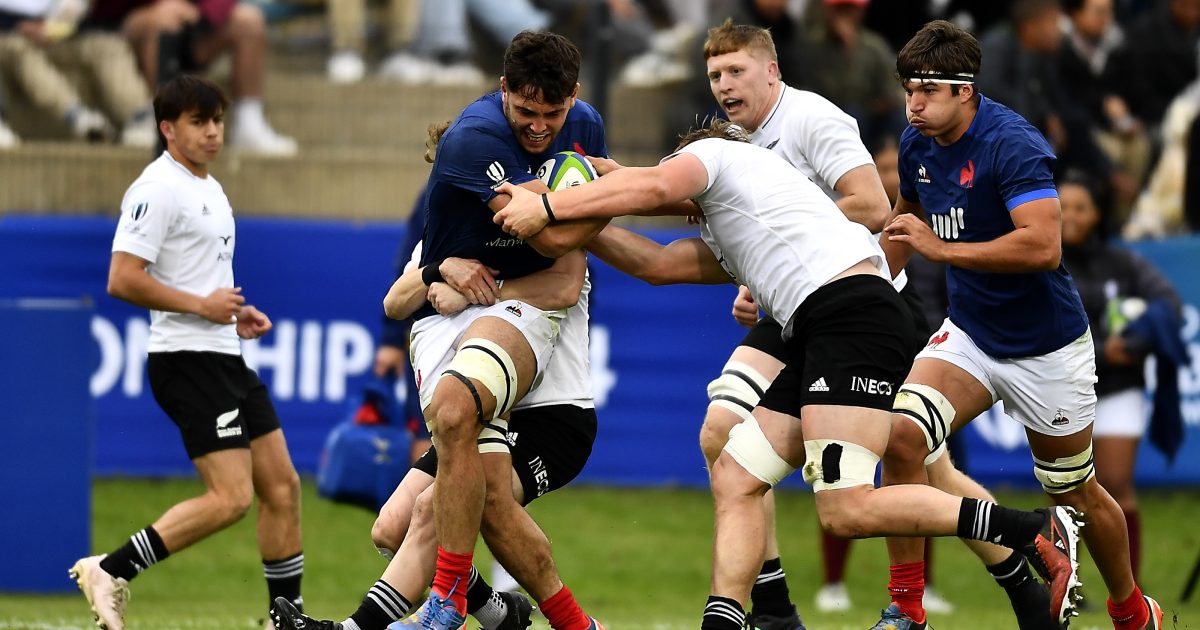U20s: “The haka will be secondary,” say Les Bleuets

Les Bleuets are no strangers to the Junior Blacks. In their second Pool A match on 4 July, the reigning world champions came up against a formidable side that had won the U20 Rugby Championship two months earlier. Despite being accustomed to mid-table finishes in recent years (7th in 2023), New Zealand have not won since 2017, apart from the Oceania Championships in 2018 and 2022.
But the team is back on track, and in pretty good shape. Against France they were in control and won by a single point (27-26). At the other end of the pitch, the team struggled mightily when it mattered most. Back row Joe Quere Karaba pointed to a “lack of vision” and lamented that the team “couldn’t keep our cool. At the back we made a lot of mistakes and were punished with penalties because of that lack of focus. Towards the end, everyone wanted to do their bit and we didn’t stick together, which was a real shame. If we’d stuck together, the end of the game might have been different.”
A sense of revenge
In the days that followed, it was difficult to rally the squad amid doubts about their chances of qualifying for the finals. This frustration, this unpleasant surprise, this sad experience is something that France U20 are determined to turn into an asset. So much so, in fact, that the Bleuets are going into this semi-final fully armed.
“It’s an added advantage to see how they reacted to what we did and to be able to adapt very quickly to what we did two weeks ago,” says captain Hugo Reus.
“Of course, there’s always a sense of revenge. We lost the last game. We felt like we were eliminated in the group stage. The feeling of revenge will be there. But we’re looking at it as a semi-final. We can’t put everything down to the fact that they beat us. We know what we can do and we’re confident in what we’ve got. If we play the way we know how, we shouldn’t have any problems.”
Coach Sébastien Calvet: “If we can correct those elements – and we saw progress against Wales – if we can continue to improve our game and not give the Blacks so much possession, I think our rugby will be enough to get us through.”
Reworked connections
The squad has rallied behind its leaders, who have gradually taken on more weight in the group as the staff have receded into the background. Training sessions have become more focused and cohesive, culminating in a 29-11 victory over Wales that saw them qualify as the best second.
“The more we train, the stronger the group becomes, both in terms of precision and communication. We need to be more precise, more decisive in the try-scoring areas and in the big moments, because we didn’t do that in the last game; we had the chance and we gave New Zealand the chance to get back into the game,” lamented Hugo Reus.
“We are worried about the lineouts, and we hope to do well there. We defended well in the first game, and we’ll have to do the same in this one if we don’t want to give them the chance to come back.
“The group is getting more fluid and that’s what counts. It’s also about keeping our composure, which we didn’t do in the first game against the Blacks. We can’t let that happen again. I’m not worried about the leaders coming into this game to lead the team to victory.”
The importance of the weather
They know how the Blacks play. And they know the weather too, as they battled through the mud at the Athlone Sports Stadium against Wales.
“Yesterday’s training session was cancelled; we couldn’t go out on the training pitches,” confided coach Sébastien Calvet on Friday 12 July. “It’s just that we’re in the third week of the competition and we’re more concerned with analysis and clarity than with training on the pitch.”
However, the Bleuets do have one unexpected advantage in their favour: the terrible weather that has plagued France for the past nine months. And La Rochelle’s Reus knows a thing or two about it, having mastered the footwork of playing into the wind against the Welsh.
“I’d prefer to play in a bit of sunshine, but it’s true that playing in the wind every day helps a bit. There’s a lot of it in La Rochelle. All over France this year, all the clubs have had to deal with complicated weather and very little good weather,” he admits.
No pressure before the Haka
The final parameter will be the haka confrontation. The one on 4 July lasted over a minute and 30 seconds and the Bleuets, as tight-knit as ever, didn’t miss a beat. The one on 14 July will have an air of déjà vu about it, minus the impact.
“Having been there before, it’s a great moment, a moment of tradition. It’s great to see it in real. But when you’re concentrating on the next 80 minutes, you try to look beyond that; you watch and concentrate on what you’re going to do for 80 minutes,” said the captain.
“It didn’t affect them too much and we got off to a great start against the Blacks. Now that they’ve been through it, I don’t think the haka will play a part for us,” says Sébastien Calvet.
The Bleuets are ready to bounce back. They still have two games in hand if they are to win a fourth successive world title. Only New Zealand have done it before them.



















































